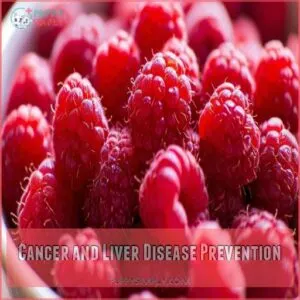This site is supported by our readers. We may earn a commission, at no cost to you, if you purchase through links.
 Yes, your dog can safely eat raspberries!
Yes, your dog can safely eat raspberries!
These sweet little berries pack powerful health benefits, including antioxidants that fight inflammation and fiber that aids digestion.
While they’re perfectly safe as an occasional treat, you’ll want to keep portions small – just like you wouldn’t eat an entire cake in one sitting.
For most dogs, 6-10 raspberries make the perfect serving size.
They’re especially great for senior pups, as they contain natural compounds that help with joint health.
Just remember to wash them thoroughly first, and you’ll be surprised at the clever ways you can incorporate these nutritious berries into your dog’s diet.
Table Of Contents
- Key Takeaways
- Can Dogs Eat Raspberries
- Are Raspberries Safe for Dogs
- Benefits of Raspberries for Dogs
- Risks of Feeding Raspberries to Dogs
- How Many Raspberries Can Dogs Eat
- How to Safely Feed Raspberries to Dogs
- Precautions and Interactions
- Frequently Asked Questions (FAQs)
- Can dogs eat raspberries?
- Can one eat raspberries if they have type 2 diabetes?
- Can dogs eat raspberry jam?
- Can dogs eat chia & raspberries?
- Can dogs eat raspberries if they have hypoglycemia?
- Why does my dog have diabetes if he eats raspberries?
- How many raspberries can my dog eat?
- What fruit can’t dogs eat?
- What berries are not good for dogs?
- Are raspberry bushes toxic to dogs?
- Do raspberries affect a dogs allergies?
- Can puppies eat raspberries safely?
- Are dried raspberries safe for dogs?
- Can raspberry juice be given to dogs?
- How do raspberries interact with dog medications?
- Conclusion
Key Takeaways
- You can give your dog raspberries, but only in moderation. Too many can cause digestive upset.
- Small dogs need fewer raspberries than large dogs. Start with 1-2 and increase gradually.
- Raspberries offer several health benefits, including antioxidants and fiber.
- Always wash raspberries thoroughly before feeding them to your dog, and watch for any allergic reactions.
Can Dogs Eat Raspberries
Looking to add some variety to your dog’s treats? You can feed your pup raspberries, and they might even love these juicy little berries.
Dogs can enjoy raspberries as an occasional treat, much like they’d munch on blueberries or strawberries.
Raspberries are a nutrient-rich and low-calorie snack, rich in antioxidants as noted in the ultimate guide to what chihuahuas can and cant eat (Chihuahua safe fruits). While these sweet treats aren’t essential to your dog’s diet, they can be a delightful snack, especially during warm weather.
Think of raspberries as nature’s candy for your four-legged friend – they’re tasty and offer some nutritional benefits too.
Just remember, like any treat, moderation is key.
Are Raspberries Safe for Dogs
Yes, raspberries are safe for your furry friend when served in moderation.
These sweet treats contain minimal amounts of xylitol, but you’d need to feed your pup an enormous quantity – about 2.5kg for a 10kg dog – before seeing any toxic effects.
Raspberries also offer numerous health benefits, including vitamins, antioxidants, and dietary fiber for digestion.
While some dogs might’ve individual sensitivities, most can enjoy these berries without issues.
Just remember to wash them thoroughly and remove any stems or leaves before serving.
If you’re introducing raspberries for the first time, start with a small amount and watch for any unusual reactions.
Benefits of Raspberries for Dogs
You’ll be happy to know that these tiny red berries pack a powerful health punch for your furry friend, from improving digestion to boosting immune function.
Raspberries are a great source of vitamins, minerals, and antioxidants that help fight disease and support overall wellness.
Your dog can enjoy raspberries’ rich blend of vitamins, minerals, and antioxidants.
Antioxidants
Powerhouse antioxidants in raspberries work like tiny bodyguards for your dog’s cells.
These natural compounds, including anthocyanins and ellagic acid, fight harmful free radicals that can damage your pup’s body over time.
They’re particularly good at supporting brain health and reducing inflammation.
Research suggests these antioxidants may help prevent certain cancers and slow down aging in our four-legged friends.
Fiber
Your pup’s digestive system will thank you for those fiber-rich raspberries.
Like a gentle broom for their gut, the fiber in raspberries helps keep your dog’s digestive system running smoothly and can even help with weight management.
Each raspberry provides a natural source of both soluble and insoluble fiber, promoting healthy bowel movements and helping your furry friend feel fuller for longer.
Vitamins
Inside those tiny red gems, raspberries pack a punch of essential vitamins that can boost your dog’s health in multiple ways.
These juicy treats provide a natural source of key nutrients that support your pup’s overall wellbeing.
Raspberries also complement a balanced puppy diet rich in omega-3 fatty acids for coat health.
- Vitamin B6 helps with hormone production and protein synthesis
- Vitamin C strengthens the immune system and supports collagen production
- Vitamins E and K work together to maintain healthy blood and tissue function
Improved Digestion
The high fiber content in raspberries works like a natural digestive aid for your dog’s gut health.
When you add these berry treats to your pup’s diet, they help maintain regular bowel movements and promote the growth of beneficial gut bacteria.
Think of raspberries as tiny digestive superheroes, packed with prebiotics that support a healthy intestinal environment and make digestion smoother for your furry friend.
Weight Loss
Supporting healthy digestion is just the start – raspberries pack a powerful punch for weight management too.
These tiny red gems offer a perfect solution for pups watching their waistline:
- Only 64 calories per cup
- High fiber content keeps dogs feeling fuller longer
- Natural sugars provide energy without empty calories
When combined with regular exercise and a balanced dog food plan, raspberries make an excellent low-calorie treat that won’t tip the scales.
Cancer and Liver Disease Prevention
Beyond weight management, raspberries pack a powerful punch against serious health concerns. Ellagic acid, a natural compound in these berries, shows promising results in supporting your dog’s liver health and fighting cancer cells.
Ellagic acid targets abnormal cells.
Shown to slow tumor growth.
Antioxidants reduce inflammation.
Helps maintain liver function.
Free radical neutralization.
Protects healthy cell DNA.
| Benefit | How It Works | Research Finding |
|---|---|---|
| Cancer Defense | Ellagic acid targets abnormal cells | Shown to slow tumor growth |
| Liver Protection | Antioxidants reduce inflammation | Helps maintain liver function |
| Cell Health | Free radical neutralization | Protects healthy cell DNA |
Infection Prevention
Powerful anthocyanins in raspberries work like tiny superheroes in your dog’s body, fighting off harmful bacteria and boosting their immune system. Here’s how these natural defenders help protect your pup:
- Neutralize damaging free radicals
- Decrease bacterial growth in the digestive system
- Support natural immune response
- Provide protective antioxidant effects
- Help maintain healthy cell function
Your dog’s immune system gets stronger with each serving, making raspberries a tasty way to keep infections at bay.
Risks of Feeding Raspberries to Dogs
While raspberries can be a tasty treat for your dog, you’ll want to know about potential risks like digestive issues and xylitol content.
You should be especially careful about portion sizes, as too many raspberries can upset your pup’s stomach and, in rare cases, lead to xylitol toxicity.
Digestive Issues
While raspberries are generally safe for dogs, they can cause digestive issues if not fed properly.
Here’s what you need to watch for:
| Symptom | Common Causes | Prevention Tips |
|---|---|---|
| Diarrhea | Overfeeding | Start with 1-2 berries |
| Gas | Unwashed fruit | Clean thoroughly |
| Bloating | Rapid eating | Cut into smaller pieces |
Your pup might experience mild stomach upset when first introducing raspberries.
Like humans adjusting to new foods, dogs need time to adapt to these fiber-rich treats.
Xylitol Toxicity
Inside those juicy red raspberries lurks a natural substance called xylitol that can be dangerous for your furry friend.
If you’re concerned about xylitol levels, you can explore products related to xylitol in raspberries.
You’ll need to know these red flags of xylitol toxicity:
- Vomiting and lethargy within 30 minutes
- Dangerously low blood sugar levels
- Seizures in severe cases
Don’t panic though – your pup would need to eat about 2.5kg of raspberries per 10kg of body weight to reach toxic levels. Just stick to the recommended serving sizes.
Overconsumption
Beyond the health benefits, excessive raspberry consumption can lead to digestive troubles in your furry friend.
Here’s what happens when your pup goes overboard with these tasty berries:
| Symptom | Cause | Action Required |
|---|---|---|
| Diarrhea | Fiber overload | Restrict treats for 24hrs |
| Vomiting | Gastric irritation | Contact vet if persistent |
| Bloating | Sugar fermentation | Monitor closely |
| Lethargy | Digestive stress | Offer fresh water |
| Discomfort | General upset | Return to normal diet |
How Many Raspberries Can Dogs Eat
You’ll need to watch your dog’s raspberry portions based on their size, just like you wouldn’t let your kid eat an entire cake.
For a quick guide, small dogs can enjoy 1-3 berries while larger breeds can handle up to a handful, but you’ll want to start with smaller amounts to see how your pup responds.
Recommendations by Dog Size
Every dog’s size determines their raspberry serving.
For extra-small pups (2-20 pounds), stick to 1-2 raspberries.
Small breeds (21-30 pounds) can enjoy 2-3 berries, while medium-sized dogs (31-50 pounds) can handle 5-6.
Large breeds (51-90 pounds) can have a small handful, and extra-large dogs (90+ pounds) can safely eat a full handful.
Remember, these portions account for your dog’s weight and metabolism.
General Guidelines
While those size-based recommendations give you a starting point, here are some general rules that’ll keep your pup safe when sharing raspberries:
- Start with just one or two berries to test your dog’s reaction
- Feed raspberries as an occasional treat, not a daily snack
- Limit treats to 10% of your dog’s daily calorie intake
- Skip raspberries if your dog has a sensitive stomach
- Only serve fresh, washed raspberries – never canned or preserved
Important Considerations
Before you get too generous with those raspberries, consider your dog’s individual needs.
If they’re battling health conditions or on medications, check with your vet first.
You can also find healthy and safe dog raspberry treats online, such as on websites that sell products specifically for dog raspberry treats.
Keep track of how often you’re dishing out these treats – they should only make up 10% of your pup’s daily calories.
And remember: some dogs might’ve allergies, so start small and watch for any reactions.
How to Safely Feed Raspberries to Dogs
You’ll want to make sure you’re serving raspberries to your dog safely by washing them thoroughly and removing any stems or leaves first.
Raspberries can be a healthy treat, but you’ll need to monitor your pup for any unusual reactions and keep the portions small, following your vet’s recommended serving size for your dog’s weight.
Preparation and Serving
Now that you know the right serving size, let’s get those raspberries ready for your furry friend. Proper preparation makes sure your dog gets all the benefits without any risks.
- Wash raspberries thoroughly under cool water to remove dirt and pesticides
- Remove any stems, leaves, or moldy berries from the bunch
- Cut larger raspberries in half for smaller dogs to prevent choking
- Store extras in an airtight container in the fridge for up to 3 days
Monitoring Adverse Reactions
After preparing your dog’s raspberry treat, keep a watchful eye out for any red flags.
Watch for signs of raspberry allergy symptoms like vomiting, diarrhea, or unusual scratching.
If you suspect your dog has a raspberry allergy, you can find products specifically designed for their needs at a dog raspberry allergy store Raspberry Allergy Products.
If your pup shows digestive upset signs within 24 hours of eating raspberries, it’s best to skip them next time.
Some dogs might get an upset tummy even from properly prepared portions, so trust your instincts.
Ensuring a Balanced Diet
While you’re keeping an eye on your pup’s reaction to raspberries, remember they should make up no more than 10% of your dog’s daily food intake.
Mix these berries into their regular dog food or homemade meals as an occasional treat.
You’ll want to maintain a well-rounded diet focused on high-quality protein sources, with fruits serving as healthy supplements rather than meal replacements.
Precautions and Interactions
While you can safely treat your dog with raspberries, you’ll need to watch out for potential interactions with their medications or health conditions.
If you’re unsure about feeding raspberries to your furry friend, it’s always best to check with your vet first, especially if your dog has diabetes or digestive issues.
Interactions With Health Conditions
Dogs with diabetes should exercise caution when eating raspberries due to their natural sugar content.
If your pup has kidney disease, limit raspberry intake since their high potassium levels could cause complications.
For dogs with allergies, introduce raspberries gradually and watch for reactions.
Those with liver issues or digestive problems should avoid raspberries completely, as they might strain these already sensitive systems.
Interactions With Other Foods
When mixing raspberries with your dog’s regular meals, you’ll want to think about how they interact with other foods.
Pairing raspberries with the right foods can maximize their benefits.
You can also incorporate raspberries into your dog’s grain-free dog food recipes.
Mix them into kibble or homemade meals for added nutrition.
Combine with other safe fruits like blueberries or apple slices for a varied treat.
Avoid serving with high-fat foods, which could upset your pup’s stomach.
Consulting a Veterinarian
Before adding raspberries to your pup’s diet, schedule a quick chat with your vet.
They’ll consider your dog’s allergies, pre-existing conditions, and dietary restrictions to give you personalized advice.
Your vet can also recommend the perfect portion size and suggest creative ways to incorporate these treats into training sessions.
Think of them as your pet’s personal nutrition coach!
Frequently Asked Questions (FAQs)
Can dogs eat raspberries?
Yes, dogs can enjoy raspberries in moderation!
These berries are low in calories, packed with fiber and vitamins.
Be cautious, though, as too many might upset their tummy.
Just a few berries will do the trick!
Can one eat raspberries if they have type 2 diabetes?
Yes, you can enjoy raspberries if you have type 2 diabetes.
They’re low in sugar and high in fiber, which helps manage blood sugar levels.
Plus, they’re packed with antioxidants for added health benefits.
Enjoy in moderation!
Can dogs eat raspberry jam?
Raspberry jam isn’t ideal for dogs.
It’s packed with sugar and sometimes artificial sweeteners like xylitol, which is highly toxic to dogs.
If your pup craves berries, stick to fresh raspberries in moderation for safety.
Can dogs eat chia & raspberries?
My golden retriever, Gus, loved chia seeds sprinkled on his raspberries!
Moderation’s key; chia seeds are generally safe, but too many can upset a dog’s tummy.
A few raspberries are fine, too, but watch for tummy troubles.
Can dogs eat raspberries if they have hypoglycemia?
For dogs with hypoglycemia, raspberries are safe when given in moderation.
They’re low in sugar and calories, offering benefits without raising blood sugar levels too much.
Always monitor your dog’s reaction and consult your vet if unsure.
Why does my dog have diabetes if he eats raspberries?
Eating raspberries isn’t a direct cause of diabetes in dogs.
Diabetes develops from complex issues like genetics, obesity, or other dietary factors.
Raspberries can be part of a balanced diet, but moderation is key.
How many raspberries can my dog eat?
Your dog can enjoy a few raspberries safely.
Feed 1-2 to extra-small dogs, 2-3 for small ones, 5-6 for medium, and a small handful for large dogs.
Always observe your pup for any reactions!
What fruit can’t dogs eat?
Dogs shouldn’t eat grapes, raisins, avocados, cherries, tomatoes, or tamarind.
These fruits can cause serious health issues like kidney failure, gastrointestinal upset, or toxicity.
Keep these out of your pup’s reach to protect their safety.
What berries are not good for dogs?
Imagine this: berries dangling like forbidden jewels, enticing but risky for dogs.
Grapes and raisins are definite no-gos, and be cautious with tomatoes.
Their skins hide potential danger.
Keep your furry buddy safe from these tempting treats.
Are raspberry bushes toxic to dogs?
Raspberry bushes themselves aren’t toxic. However, the berries contain small amounts of xylitol, which is harmful to dogs in large quantities. Moderation is key!
Do raspberries affect a dogs allergies?
An ounce of prevention is worth a pound of cure.
Raspberries likely won’t trigger allergies in dogs, but every dog is unique.
Watch for itching or discomfort after eating raspberries and consult your vet if concerns arise.
Can puppies eat raspberries safely?
Sure, puppies can munch on raspberries safely, but keep it in moderation.
They’re a fun treat loaded with nutrients, yet too many can upset your pup’s tummy.
Start small, watching closely for any quirky reactions.
Are dried raspberries safe for dogs?
Dried raspberries aren’t the best snack for dogs.
They’ve higher sugar content, which may upset your pup’s stomach or contribute to weight gain.
Keep it light and stick to fresh raspberries in moderation for safety.
Can raspberry juice be given to dogs?
Giving your dog raspberry juice isn’t a great idea—too much sugar and potential xylitol risk from concentrated amounts can upset their stomach.
Stick with whole raspberries in moderation for a safer, healthier treat.
How do raspberries interact with dog medications?
Raspberries might affect your dog’s medications, especially if they’ve blood sugar or blood pressure issues.
Always check with your vet, as certain drug interactions could occur, potentially impacting treatment efficacy or causing side effects.
Conclusion
Regarding feeding raspberries to your furry friend, think of them as nature’s tiny powerhouses packed with nutrients.
These tasty treats can offer great health benefits thanks to their antioxidants and fiber, but moderation is key.
Stick to the recommended serving sizes, and you’ll help avoid any potential issues like digestive upset or xylitol concerns.
When introducing new fruits like raspberries, it’s also essential to remember that some fruits, such as grapes and raisins, can be toxic to dogs. Always introduce any new food, including raspberries, gradually into your dog’s diet for a safe and enjoyable experience.





















